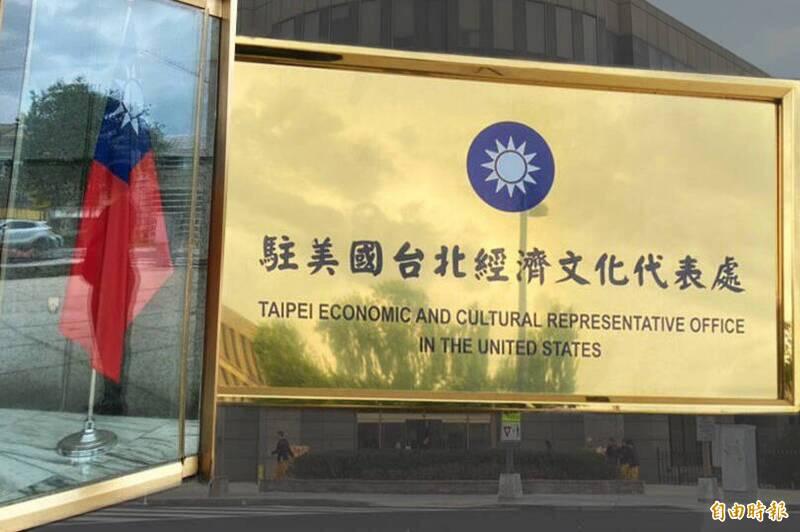A bill was introduced in the US Senate this week to negotiate renaming Taiwan’s de facto embassy in Washington as the “Taiwan representative office,” National Review reported yesterday.
The Taiwan Representative Office Act, introduced by US senators John Curtis and Jeff Merkley, would direct the US secretary of state to negotiate the rechristening of the Taipei Economic and Cultural Representative Office (TECRO).
The bill would also require US government officials to change all references in documents from TECRO to the new name.

Photo: Taipei Times
The legislation underscores the US’ commitment to Taiwan’s democracy and enhances clarity in the US-Taiwan relationship, Curtis said in a statement.
The choice to use “Taipei” instead of “Taiwan” in the office's name was to avoid offending China, he said.
“The United States shouldn’t tolerate pressure from China to undermine the Taiwanese people,” he said. “Instead, it should stand by its democratic allies and friends around the world facing pressure and coercion from authoritarian regimes.”
The act elevates the US’ relationship with Taiwan while maintaining that Washington’s “one China policy” is not to be confused with Beijing's “one China principle,” he said.
“By renaming TECRO as the Taiwan representative office, our bill acknowledges the reality that this office represents the people of Taiwan, not just the economic interests of the city of Taipei,” he said.
“Taiwan’s democracy is vital to peace and stability in the Indo-Pacific region, and the United States must continue pursuing opportunities that strengthen our partnership with Taiwan,” Merkley said in the statement.
Vincent Chao (趙怡翔), a former TECRO political director, told National Review that the proposed nomenclature change would be consistent with efforts to “push back against Chinese actions that degrade Taiwan’s international space” and is in line with US policy that has long used the name Taiwan, including in the 1979 Taiwan Relations Act.
“I think that this bill would be welcomed by the people of Taiwan and I think certainly there’s a hope that the sentiments expressed in this bill would be taken into consideration by the executive branch,” Chao was quoted as saying by the US magazine.
China has previously lashed out at countries that use Taiwan’s name for the country’s diplomatic outposts. In 2021, Lithuania allowed Taiwan to open a representative office that used the country’s name, rather than that of its capital city. The Chinese government responded with economic reprisals.
In the same year, the administration of former US president Joe Biden reportedly considered renaming TECRO to Taiwan representative office, but the change was never implemented.
In 2023 and last year, similar bills were introduced in the US House of Representatives and the Senate, but did not gain enough traction to pass in either chamber.
Curtis, who was then a member of the House, put forth one of the bills, while then-US senator Marco Rubio sponsored the other during the final two years of Biden's presidency.
Taiwan's representative offices in countries with which it does not have diplomatic ties are typically named the Taipei economic and cultural office or the Taipei representative office, in keeping with the host countries' preference to avoid any references that would imply Taiwan is a separate country from China.
As the US and Taiwan, officially named the Republic of China, ended official ties in 1979, the latter's Washington office has been called TECRO.

Taiwan is stepping up plans to create self-sufficient supply chains for combat drones and increase foreign orders from the US to counter China’s numerical superiority, a defense official said on Saturday. Commenting on condition of anonymity, the official said the nation’s armed forces are in agreement with US Admiral Samuel Paparo’s assessment that Taiwan’s military must be prepared to turn the nation’s waters into a “hellscape” for the Chinese People’s Liberation Army (PLA). Paparo, the commander of the US Indo-Pacific Command, reiterated the concept during a Congressional hearing in Washington on Wednesday. He first coined the term in a security conference last

Prosecutors today declined to say who was questioned regarding alleged forgery on petitions to recall Democratic Progressive Party (DPP) legislators, after Chinese-language media earlier reported that members of the Chinese Nationalist Party (KMT) Youth League were brought in for questioning. The Ministry of Justice Investigation Bureau confirmed that two people had been questioned, but did not disclose any further information about the ongoing investigation. KMT Youth League members Lee Hsiao-liang (李孝亮) and Liu Szu-yin (劉思吟) — who are leading the effort to recall DPP caucus chief executive Rosalia Wu (吳思瑤) and Legislator Wu Pei-yi (吳沛憶) — both posted on Facebook saying: “I

The Ministry of Economic Affairs has fined Taobao NT$1.2 million (US$36,912) for advertisements that exceed its approved business scope, requiring the Chinese e-commerce platform to make corrections in the first half of this year or its license may be revoked. Lawmakers have called for stricter enforcement of Chinese e-commerce platforms and measures to prevent China from laundering its goods through Taiwan in response to US President Donald Trump’s heavy tariffs on China. The Legislative Yuan’s Finance Committee met today to discuss policies to prevent China from dumping goods in Taiwan, inviting government agencies to report. Democratic Progressive Party Legislator Kuo Kuo-wen (郭國文) said

The Ministry of Economic Affairs has fined Taobao NT$1.2 million (US$36,900) for advertisements that exceeded its approved business scope and ordered the Chinese e-commerce platform to make corrections in the first half of this year or its license would be revoked. Lawmakers have called for stricter supervision of Chinese e-commerce platforms and more stringent measures to prevent China from laundering its goods through Taiwan as US President Donald Trump’s administration cracks down on origin laundering. The legislature’s Finance Committee yesterday met to discuss policies to prevent China from dumping goods in Taiwan, inviting government agencies to report on the matter. Democratic Progressive Party